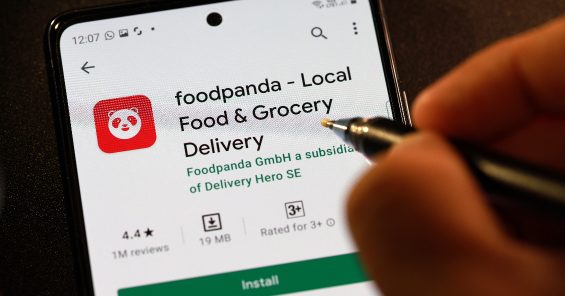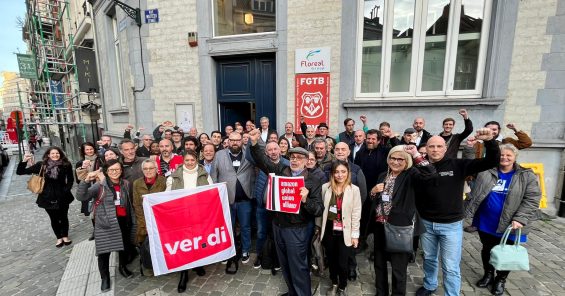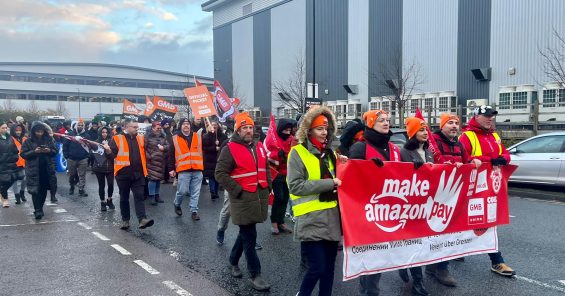Quick commerce in Romania – a snapshot

This article is written by guest author Radu Stochita. It is intended as an independent journalistic snapshot of dark stores and workers’ conditions in Romania. It was commissioned as part of a joint project between the FES Competence Centre on the Future of Work and UNI Europa.
The Romanian quick commerce market is in its infancy. Dark stores have been growing in popularity in Western Europe, but only in the past three years have they have been popping up in the big Romanian cities. Nevertheless, it presents a risk to worker power in the retail sector which has already been difficult to attain because of anti-union practices and high turnover rates.
In the early months of 2021, food delivery company Foodpanda (later acquired by Glovo) opened its own stores in Cluj and Bucharest, aiming to deliver groceries in thirty minutes to their customers. In 2021, the Spanish food delivery app Glovo secured $100 mln. in funding to expand their network of dark stores in Romania, Italy, Portugal and Spain. At the beginning of 2022, the French retail chain Auchan hired 250 people to work on their first dark store. In May 2022, it launched in Pipera, a rich Bucharest suburb.
Daniel, a packer inside a recently-opened dark store talked about the productivity quotas and how the managers remind them of how fast they must work: “The moment I clock in it is all go go go. We get breaks, of course, because the law mandates them to do so, but since customers expect their groceries in 1-2 hours, we have to pack everything quickly. Sometimes it feels like we are robots.”
Vasile Gogescu, President of Federația Sindicatelor din Comerț agrees with Daniel “the pressure is immense of the employees and we see it in traditional supermarkets where demand has increased and the hirings have stagnated. We end up having people doing more tasks.” Though, the recent legislative changes give Vasile hope, saying that “now we will be able to go back to the roots of true unionism, and employers that prevent us from talking to their workers or advocating for their rights will face hefty fines”.
Companies promise fast-delivery and in some cases claim 1-hour deliveries from the moment a person places the order inside the app. To do so, companies must open multiple spaces all throughout neighborhoods in order to reach the customers. The urban landscape is changing, with online shopping companies buying up physical spaces inside neighborhoods, and then filling the streets with delivery cars.
In the early 2000s, Sainsbury opened its first dark store in the United Kingdom: a typical supermarket that didn’t grant access to customers, but only to its workers. Europe accounts for roughly 1500 of dark stores, with the majority located in Russia, Turkey and China, but companies and their investors believe there is growth potential elsewhere in Europe. In Poland, there are local tech companies receiving investor funds to develop dark store infrastructure, while local supermarket chains are partnering up with UBER to deliver groceries in 30 minutes.
The retail sector has grown over the year from employing roughly 400.000 in 2002, reaching a summit of 560.000 in 2008, only then to stagnate around 500.000 until 2016. Regardless of its relative meager growth in personnel size, the revenue has increased at least four-fold from 10 billion EUR a year in 2002 to 40 billion EUR in 2016.
According to Vasile, “unionization has been tough in the retail sector because of the restrictive legislation. We have roughly 2% of the entire sector unionized, but with such a small number, bosses consider their employees as being swiss army knives: doing everything from moving crates to delivering food”.
Diana, a female worker in a big German supermarket in Romania describes her work as “intense, since not only our bosses have demands from us but our customers who grow more impatient by the day”. When asked about dark stores, Diana said that she is unfamiliar with the topic, but “promises of fast deliveries will only make life more difficult for us since they will have us work harder.”
Commerce workers aren’t the only ones to potentially lose out. Residents have been complaining about the noises caused by 24/7 opened stores. Rotterdam and Amsterdam took it a step further and banned the opening of new dark stores before coming up with a solution to protect the residents. Protests broke out in France and President Macron decreed that dark stores need to be classified as warehouses which will prohibit them from existing inside big cities.
The promises of fast delivery are not available to everyone since the services often develop in more lucrative rich urban areas. Research shows that they promote an ideology of speed, while offering plenty of products to choose from. They alienate the shopper from the reality of collecting and moving products and instead present a scenario in which goods can be on their shelves in thirty minutes. The customer is not exposed to the intensity and speed with which the workers are toiling to package their goods and bring it to their homes. It comes as no surprise that when quick delivery times are promised, workers are encouraged to drive recklessly.
Romania, much like many other European nations, does not have a clear gig platform law. While big retail chains are developing their own dark stores, so is Glovo that has come under the radar for labor abuses against the people they refuse to call employees, Vasile explained:
“It is difficult to organize retail, due to the high turnover and also due to the union busting attitude of the employers. The dark stores will make the problem more complicated, since we will have to fight not only against the employer, but against the consumesrs perception that their groceries should be delivered in thirty minutes.”
The Romanian unions have had a hard decade, with a regressive social dialogue law that limited the power of organized labor, dealing a blow to collective bargaining which fell from 100% in 2011 to 33% nowadays. Besides regressive legislation, unions had to deal with a political climate that vilified their actions, aligned them with corrupt institutions and popularized the rhetoric that organized labor only takes people’s money.
“The past decade was difficult for the unions who had to deal with so many barriers, as well as a lack of cooperation from the employers and government. When the unionization rates decreased, as well as collective bargaining, more workers ended up in precarious agreements on minimum wage,” says Vasile.
Over the past decades, retail has cemented its position as a high-growth sector that can beat inflation, ballooning to 20% in the past year alone. The vast supermarkets pushed out the small corner stores and now with the ascension of the dark stores, the local surroundings will be dominated by big-name retail chains.
While still in their infancy, Vasile talks about the importance of building solidarity amongst the workers that will be inside the dark stores. He said: “we must act at the local unit level, finding the connections we already have with some of the workers, and building trust amongst them that a union will be beneficial”. Vasile pointed to the new social dialogue legislation which gives unions a better position in negotiating sectoral agreements, thus setting a better precedent for the new business forms.
The recent law of social dialogue will “bring back unionism”, Vasile claims. The new legislation lifts the draconian condition of needing 15 workers in the same unit to form a union. Vasile agrees that “the number 15 hurt us the most, since many of the companies that we have in the sector are small shops where maybe 2, 3 people work that were not able to form unions”. The current legislation decreases the number to 10 and allows workers in multiple companies to come together and form one union.
With regards to where dark stores will fall, there is still uncertainty. Vasile argues that “their development has been limited and we barely hear of any stories coming from there. We are not sure if they will fall under transportation or retail”.
You may also be interested in

UNI’s Global Amazon Alliance issues ‘Common Demands’ for an overheating planet
24.07.24
News
Open Letters
Meetings & Events
2024
10
Sep
Protected: UNI Europa FATIMA Project – 3rd Steering Group Meeting – 10 September 2024
Commerce
ICT & Related Services
Property Services
